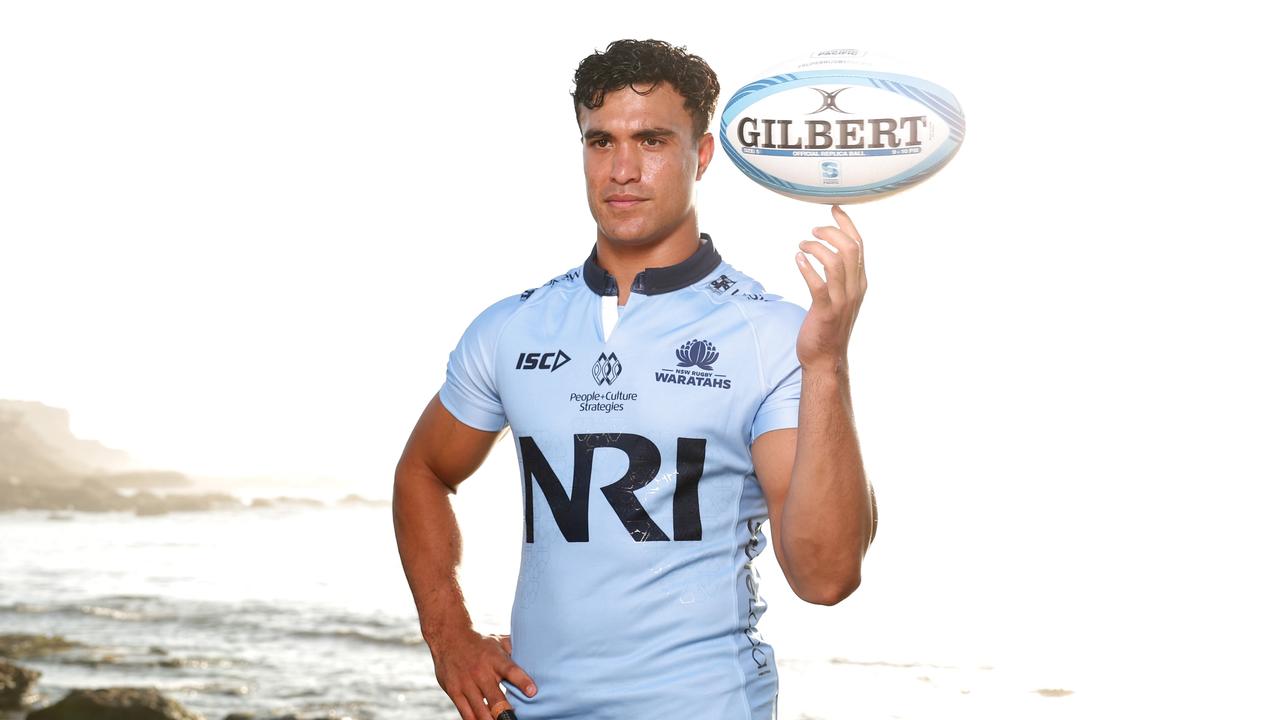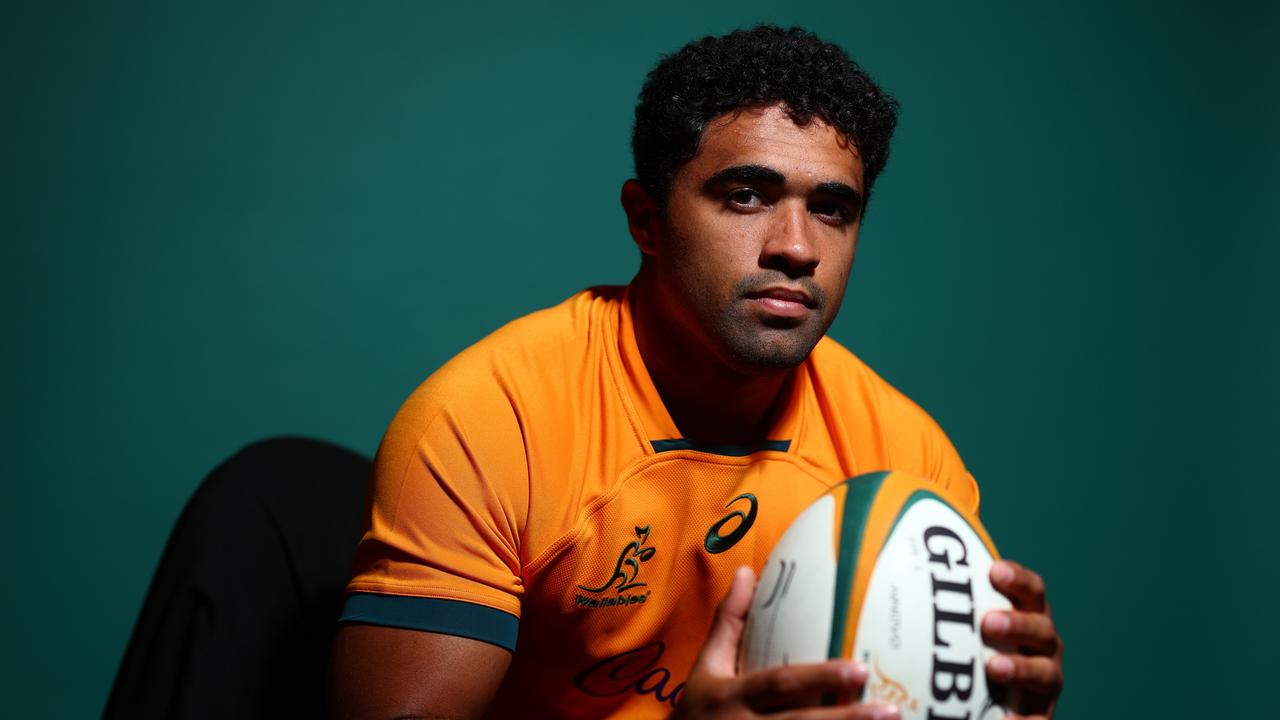Rugby World Cup: If Australia want to be world champions, they’ll need to solve these seven mysteries
THE Wallabies have just over two months to select their ultimate team and game plan to win the Rugby World Cup — our experts dissect the key issues.
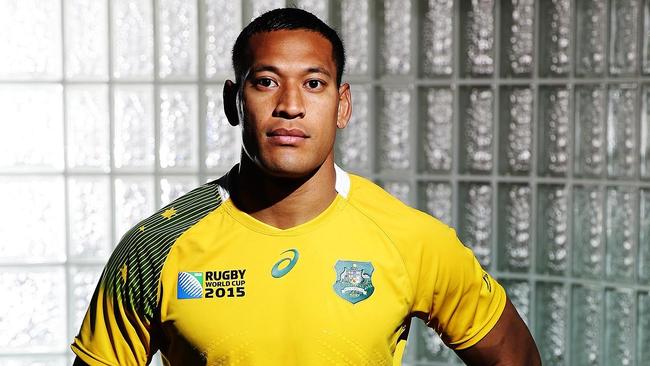
Rugby
Don't miss out on the headlines from Rugby. Followed categories will be added to My News.
THERE are just 68 days between now and Australia’s first World Cup match.
If the Wallabies are to pull off an unlikely triumph in England, they will need to address and solve seven key issues, all vital pieces of the jigsaw puzzle which together can form a winning campaign.
Can the Wallabies scrum cope with the onslaught coming their way?
And it’s coming, no question. The last decade and the 2013 Lions series kind of gave it away, but if there was any teensy-tiny particle of doubt about the Wallabies’ scrum being an Achilles heel, the Spring Tour last year got rid of that subatomic spec.
England attacked hard and Australia crumbled. Game over.
Michael Cheika spoke afterwards about the importance of fixing this wretched scrum curse once and he has taken steps.
Mario Ledesma, a veteran of four World Cups for Argentina, has been brought in by Cheika from the Waratahs where he coached the NSW scrum.
Cheika also punted Benn Robinson and Ben Alexander — the two most capped Wallabies props — and brought in Scott Sio and Greg Holmes.
Will it work?
The proof will be in the pushing ultimately but what clues have we got?
Ledesma’s influence appeared to get early pay with the Waratahs, particularly in the long-sequence scrummaging so often seen at Test level.
But by season’s end the NSW scrum had suffered for inconsistency and gone backwards, statistically speaking. The Tahs finished 10th out of 15 teams for both scrums won and scrum success.
Does Ledesma have better cattle in Slipper, Moore and Kepu? That’s probably a fair call.
Will their backups be good enough to survive under the Test furnace? The jury is out and will return in mid-August.
Should Robinson still be training hard in case of yet another emergency call-up? You betcha.
Partnerships in the halves?
Cheika and new backs boss Steve Larkham have so little time until the World Cup that it seems certain that the key halfback/five-eighth call will be based on a proven partnership.
Will Genia and Quade Cooper have been given first shot against South Africa in Brisbane. You can be certain the firm of Nick Phipps and Bernard Foley will also get their chance.
Cooper and Genia played in a Queensland Reds side with a dud attacking shape. Cheika wants to find out immediately if Cooper and Genia can click in a good one with big outside backs and the bullocking, line-bending forwards that the Reds never had.
The comparison has often been made that Cooper is Larkham-like with the way he plays flat at the line and forces misreads by defenders with the slickness of his array of passes.
Larkham is backing Cooper first up. There is also a considerable dose of getting Cooper match-fit quickly after so little Super Rugby.
Little has been said about Matt Toomua but Larkham is a huge fan and has openly said in the past that his starchy defence and more direct play would work the best against the All Blacks at No.10.
Horses for courses at five-eighth might yet be an intriguing twist to selections in the run to the World Cup.
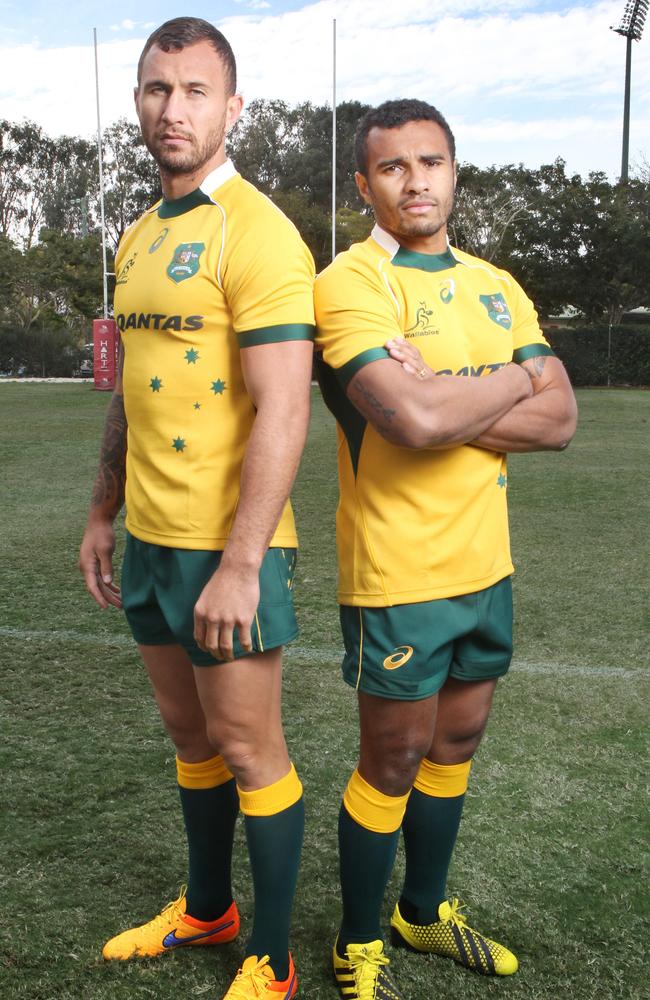
The big Skelton question — big asset or big liability?
Will Skelton proved he is worth his weight in gold for the Waratahs this year and that’s a lot of gold given he weighs 150kg.
But Skelton’s size is a long way from standard issue and a Wallabies forward pack with the big unit can’t be entirely standard either.
Skelton is so big he is not regarded as a lineout jumping lock, meaning other lineout jumping options have to be added in the backrow. That in turn can limit your ability certain players or combinations given their size or lack of lineout expertise.
On the flip side, however, you get 150kg of angry power around the field; whether it be running the ball, denting rivals in defence or ploughing through opposing mauls. You also have a deadweight rock behind the tighthead prop.
His fitness has even got to a point where he plays 80 minutes.
NSW teammate Stephen Hoiles believes there is no debate: Skelton is an x-factor talent that has to be in the side.
“When you have Simmons, a backrow of Higginbotham, Fardy and Hooper who can jump a bit, you just have to pick him,” Hoiles said.
“I look at Willy and think for all the reshuffling you’d assume you have to do at the lineout, what he offers around defensive mauls and attacking mauls, and in his ball-carrying and tight defence, that far outweighs the argument “he’s not a jumper”. He can actually jump too, in the right areas.”
Skelton had 17 lineout wins this season — five more than Cliffy Palu — and Michael Cheika is a fan who developed his over-size talent. Even if it means losing backrow versatility, expect him to fit this massive puzzle piece however possible.
Pocock and Hooper — can they play a whole Test together?
The quality of these two exceptional openside flankers could be a point of advantage for Australia but it carries an agonising caveat: it is generally accepted only one can be in the starting side.
Or to be more clear, only one can start while Will Skelton is playing in the second-row.
As mentioned, Skelton is not a lineout jumper and generally speaking, neither are Hooper (182cm) or Pocock (184cm.).
If both started in the no.6 and no.7 jerseys, that could leave only two recognised jumpers and a towering rival outfit would sweat all over them. Lineout possession would be burgled all game.
Former Wallabies skipper Nathan Sharpe says Pocock and Hooper could work — but it would mean benching Skelton.
“It doesn’t matter how much you polish it, he is not a lineout jumper,” Sharpe said.
“You could get away it but you’d need two jumping second rowers and a jumping no.8 for balance. Balance is important.”
Phil Waugh and George Smith were the last openside pair to play together but ten years ago lineouts were not as competitive as they are today.
Expect Hooper and Pocock to finish games together, however, if Skelton is taken off and Scott Fardy moves into the second row.
Is there enough finishing speed?
The Wallabies may have plenty of wingers fighting for spots but you won’t see many lining up for an Olympic 100m heat.
Lack of finishing speed is a real concern for the Wallabies.
Rob Horne has matured immensely into an excellent finisher on the left wing and his starchy defence may yet be called on for a role in midfield in the defensive pattern.
Drew Mitchell is back and showed during the European domestic season that he still possesses enough pace to burn rivals.
Adam Ashley-Cooper has wonderful experience and one of history’s best try-scoring records against the All Blacks. He doesn’t have shut-the-gate speed so if he is to be a wing solution this year he has to lift his urgency to get involved off the wing. He tends to stay on his wing.
Modern rugby’s best wingers roam. That’s why a Henry Speight may well be an X-factor when available again because backs boss Larkham was an expert at involving him one-pass off scrums in midfield or using his roaming knack elsewhere for the ACT Brumbies.
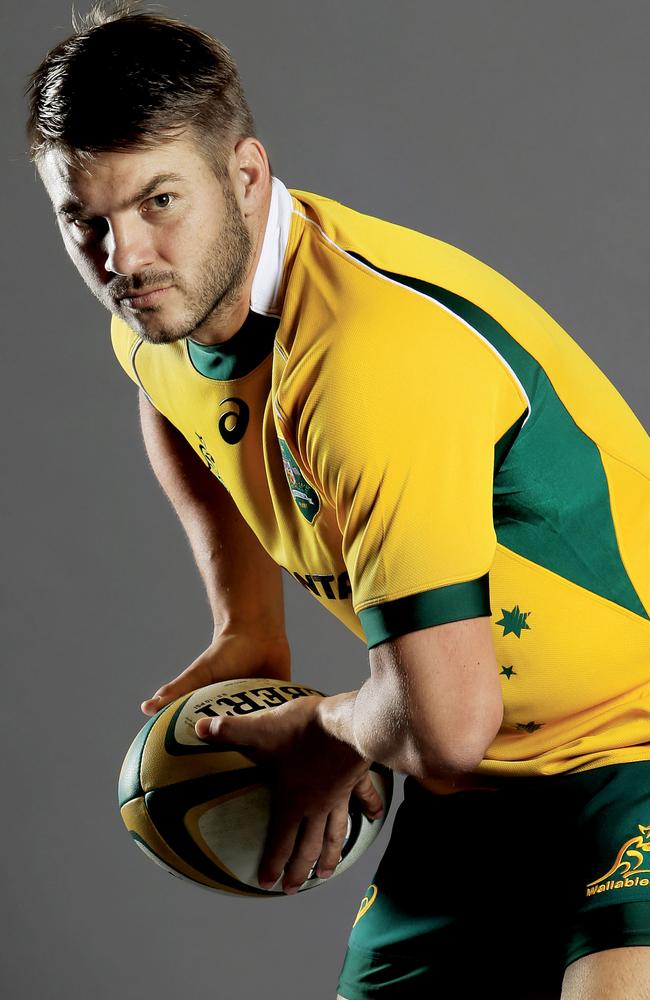
Strong leadership?
The first big call of the season was Michael Cheika making hooker Stephen Moore his World Cup-year skipper.
Hooker Moore is the ultimate representative of the highly-valued asset of experience with this Test against South Africa in Brisbane bringing up Test No.93.
You want a leader at a World Cup who has learnt from the high moments like the 2011 quarter-final win over South Africa but also someone who can trawl through the pain of big losses to channel that into a “no tomorrows” mentality.
Moore was on board for the 2007 crash in Marseille to England and and was equally gutted when missing the defining 2011 pool game against Ireland through illness.
Moore is a keeper of standards, respected and he’s clinical with the calls in big moments. He’ll take three points from a kick at penalty goal not always kick to touch to roll the dice for a lineout-drive try.
Experienced teams win World Cups and Cheika has backed that theme immediately by selecting the most experienced Wallabies Test side in history (1023 caps) to face South Africa this weekend.
When the Wallabies won the World Cup in 1999 John Eales might have been captain but teammates David Wilson, Tim Horan and Jason Little had also captained their country.
Moore is not solo on this. With Michael Hooper, David Pocock, Will Genia and James Horwill in the match squad against South Africa, there are four other players who have led their country who will own other parts of the leadership of this team.
World Cup player of tournament contender?
For Australia to win, history shows that one of their players must be the World Cup’s star performer.
Nathan Sharpe: “I’d got a feeling it could be Israel Folau, and even though people are asking whether Matt Giteau is still up to it, I have a sneaking suspicion he could be a star for the Wallabies. So one of those two.”
Iain Payten: “This award is given to the eye-catching star who wins games, so if it isn’t Israel Folau, then the Wallabies aren’t winning a tournament. Folau is the man who can burn the world’s best but he is yet to dominate at international level. This is his stage, and opportunity.”
Jim Tucker: “Only Israel Folau has that tournament-dominating vibe because history tells you a dynamic tryscorer like David Campese (1991) or Jonah Lomu (1995) is mostly likely to carry off the gong.
“I’m more excited about the player-of-the-match prospects; David Pocock dominating South Africa at the breakdown, Will Genia befuddling the English defence, Will Skelton scattering Welsh tenpins or Quade Cooper purging his World Cup demons.”
Jamie Pandaram: “It has to be Folau. He is the only Wallabies player who would make a World XV right now, and the player making opposition coaches most nervous.”
Originally published as Rugby World Cup: If Australia want to be world champions, they’ll need to solve these seven mysteries

